
Film Music Editor: Ian Lace |
||
October 1999 Film Music CD
Reviews |
|
|
![]() COMPETITION WIN
a CD of your Choice
COMPETITION WIN
a CD of your Choice
![]()
As part of our homage to Alfred Hitchcock (b.1899) our reviewers have chosen videos of Hitchcock films to review paying particular attention to the use of music in the films. These video films carry scores by Bernard Herrmann, Dimitri Tiomkin, Franz Waxman, John Williams and Ro Goodwin. Click on icons for reviews
This month we are carrying reviews of a number of classic scores distribute by Hot Records.
Jocelyn POOK Eyes Wide Shut OST
WARNER Sunset/ Reprise 9362-47450-2 [57:50]

If you remember his choice of music for his other films, you will not be surprised that Kubrick opted for a wide range of source music together with vivid and varied original music by Jocelyn Pook. Her contribution is limited to four remarkable cues. 'Naval Officer,' the subject of Nicole Kidman's erotic fantasies, is very interesting and technically accomplished writing for a modest string ensemble. It has a quality of spaciousness, vast sea vistas and rolling waves over deep waters - and loneliness. It is a highly evocative, polytonal, mini tone poem. 'The Dream' seems to be an extension of 'Naval Officer' with a high-pitched eerie tone and uncomfortable string glissandos that imply that this is not a pleasant or logical dream. It begins with a most uncomfortable chord that one recognises as the wiry humming noise one experiences in the head as one regains consciousness after a fainting spell. Extraordinary and disturbing. So, too, is 'Masked Ball' which introduces timps at the beginning of what sounds like an orchestral tuning up session, before a ghostly bass voice enters moaning in some arcane tongue to be joined by a tenor later with strings commenting darkly beneath. This is the music underscores the mysterious crimson-cloaked and masked figure that directs the ring of masked naked females out of the ring to their partners for the night in the Orgy scene and very effective it is too. 'Migrations' (composed by Jocelyn Pook and Harvey Brough), again for the orgy scenes, is a more exotic, strongly but insistent rhythmic, ethnic creation for colourful percussion, bass guitar and soprano with North African-type wailings from a tenor voice.
The source music. As for 2001, A Space Odyssey, Kubrick, chooses György Ligeti, but this time for some piano music called Musica Ricercata II (Mesto, rigido e cerimoniale). This is just a 'high-falutin' name for a collection of well-spaced, one-chord keyboard hammerings and what sounds like basic piano exercises but again, they are disturbingly and chillingly effective in the context of the film. Much more impressive (as music) is Shostakovich's Waltz 2 from his Jazz Suite played with sardonic élan by the Royal Concertgebouw Orchestra conducted by Riccardo Chailly. The other piece of classical source music is Liszt's Grey Clouds performed by Dominic Harlan (who also plays the Ligeti piece. There is also jazz from Chris Isaak - 'Baby did a bad thing,' plus the strict tempo of 'When I fall in love,' as performed by The Victor Silvester Orchestra and Duke Ellington's 'I Got it Bad' as performed by the Oscar Peterson Trio.
Other source music: 'If I had You,' performed by Roy Gerson; 'Stranger's in the Night,' performed by the Peter Hughes Orchestra; and 'Blame it on my youth' played by Brad Mehldau;
For Pook's music -

Reviewer
Ian Lace
Jerry GOLDSMITH The 13th Warrior OST
VARÈSE SARABANDE VSD-6038 [55:06]
(US cover differs)The 13th Warrior, based on a novel by Michael Crichton, is about an elegant Arab emissary (Antonio Banderas) who is abducted by a band of cruder-cultured Vikings and forced to join their quest to battle mysterious creatures legendary for consuming every living creature in their path. So Jerry Goldsmith had to not only forge a grand heroic theme in the grand traditional manner but also show the contrast between the two cultures. 'Old Bagdad' immediately suggests all the exotic colour of the locale and the heroic nature of the Banderas character in striking strongly rhythmic music. The mood of Arabian exoticism carries over into the second cue 'Exiled' beginning in more subdued and pastoral/elegiac mood before the tempo quickens and the music grows more agitated and excited. Goldsmith's textures are dense and most interesting to the ear and his ethnic orchestrations very vivid. If you remember his score for The Mummy, then you will know what to expect. There are also some extraordinary synth birdsong-like effects prominent in the third cue 'Semantics' as well as the usual array of ethnic percussion and male chanting voices. 'The Great Hall' impressively introduces archaic religious chants and church bell tollings to the Moorish modes in a mysterious/mystical mix before the heroic material asserts itself. Another richly textured track is "Eaters of the Dead" eerie and repulsive with sudden staccato shocks and particularly sour brass snarlings and glissandos.
Viking heads is a powerful orchestral outburst suggesting the strident might and brute strength of the Vikings; massive timpani and anvil hammerings support crude but thrilling brass fanfares. In 'The Sword Maker' we hear the might of Thor again plus the heroic theme which is richly developed. 'Horns of Hell' is another showcase for sets of timps across the sound stage and steel upon steel with stalwart men's chorus and the threat of mysterious creatures in the background and suspense and chase music. I think I have written enough to convey the gist of this score. The remaining tracks develop this basic material with Goldsmith's usual ingenuity.
If it is colour and excitement you want, it is here in abundance - a rich, thick-textured score with enough variety to hold the attention; however, apart from the newer synth elements, the overall impression is of familiar territory being revisited. Having said that, this score is definitely a cut above similar work from the competition
Reviewer
Ian Lace

Don DAVIS Universal Soldier The Return Performed by the composer
VARÈSE SARABANDE VSD-6068 [49:21]

After Arnold Schwarzenegger struck gold with Total Recall and Terminator 2: Judgement Day, there was a horrible time when it looked as if the muscle-bound action men were taking over from real actors. Sylvester Stallone made a box-office comeback with Cliffhanger and Demolition Man, Steven Segal had a bona fide box-office smash with Under Siege, and Jean-Claude Van Damme did better than he ever should in Hard Target, Timecop and Universal Soldier. This latter title, a cheap Terminator 2 imitation made by Dean Devlin and Roland Emmerich as a step on the way to Stargate and Independence Day, proved to be Van Damme's greatest hit. So much so that there are now two simultaneously released sequels. Universal Soldier II is a straight-to-video TV series pilot, while Universal Soldier The Return is Van Damme's 'official' follow-up. Bargain-basement video fare, it has somehow escaped into cinemas.
Given that the acclaimed science fiction action movie The Matrix catapulted Don Davis into the major league, it is surprising to find this is his follow-up project, so presumably the contracts were signed long before the former film was made. The packaging is typically minimal for a Varese Sarabande release, but at least the playing time exceeds Varese's all too common 30 minutes. The cover declares that the music is composed and performed by Don Davis, so with the exception of Jason Miller's guitars it appears this is an entirely synthesised recording. Frighteningly, such is the quality of modern samples, it is very difficult to tell: the album sounds like a combination of orchestra and electronics in typically modern military action style.
This isn't the place to come looking for tunes. Virtually the entire score consists of hard-edged suspense and combat 'Mickey-mouse' music. Davis offers lots of snare tattoos, brooding atmospheric textures, hammering, anvil-like percussion, atonal piano and fast sequenced riffs. Three tracks sound like heavy metal instrumentals, complete with squealing electric guitar. Doubtless this is appropriate, given that the film is cinema what heavy metal is to music. The best than can be said is that it is relentlessly efficient, thoroughly professional, and doubtless serves Universal Soldier The Return as well as anything might. Unfortunately, it is also utterly generic, sounding much like the accompaniment to many second-rate modern action movies. Coming full circle, it is the sort of thing Jerry Goldsmith started with his excellent score for Total Recall, but that was almost a decade ago and was an original from the pen of a master. This is not, and as an independent listening-experience, it just might enhance a game of 'Action Man'.
Reviewer
Gary S. Dalkin

Michael NYMAN & Damon ALBARN Ravenous OST The Michael Nyman Orchestra conducted by Michael Nyman
EMI 7243 5 22370 2 9 [75:55]
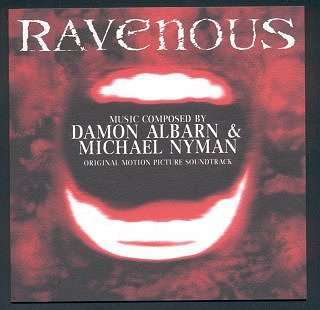
This is initially a somewhat daunting album: three of the first four tracks are out-of-tune. They are source cues, featuring the deliberately and comically bad playing of either traditional American tunes, or music in a similar idiom, by an on-screen band. A less uncompromising album would have tucked these tracks away at the end, or more likely left them off altogether. Quite what an unsuspecting customer who goes into their local record shop and, having enjoyed Michael Nyman's soundtrack to The Piano, asks to listen to this album will think is anyone's guess! The comedic cinematic potential for embarrassingly bad musicianship is well known, but without the visuals the joke obviously doesn't really work.
Even when we reach the score 'proper', it is still presents quite a challenge. There is over an hour-and-a-quarter of music, and it carries the disorientating shock of the new, such that it may take many listens to begin to formulate an opinion of the disc. This is quite a heartening achievement, that still in 1999 a film score can sound new and fresh and really not like anything which has gone before, though perhaps it is not surprising that a gothic-black-comedy-horror-cannibal-Western should have a distinctive musical accompaniment.
Clearly this is a most unusual collaboration, and it appears to be a genuine partnership of equals. On the front cover the music is credited to Damon Albarn & Michael Nyman, while on the back cover the names are in reverse order. Approaching this from a film music point-of-view, Nyman is obviously the major name: this does not sound particularly like a Michael Nyman score. There are some familiar elements, some of the composer's famed minimalist repetition and predilection for string textures, but overall this is a denser, darker and more intense work than anything I have previously heard from Michael Nyman. That said, this sounds even less like a Damon Albarn album. Albarn, for those who do not know, is the lead singer with the very successful rock band Blur. He made his film acting debut with a small role in director Antonia Bird's previous film, Face, and now has been promoted to her co-composer. Whatever his contribution to Ravenous, and he is credited in addition to composing, with co-production (with Nyman) and 'Additional sequenced orchestrations', he has not brought Blur to the cinema with him.
'Boyd's Journey' The first part of the score 'proper' opens with a single repeated plucked note on a banjo, then is joined by a drum, and a simple but very memorable melody on squeeze-box. There is a plaintive, resigned and lonely quality to the theme, which will recur throughout the score. A slow and dark minimalism stalks through 'Stranger at the Window', setting the tone for much of the following music.
Things really start to come together with 'Colquhoun's Story'. Over what appears to be a loop of part of 'Boyd's Journey', more and more layers of instrumental colour are added. First a sharp plucked steel guitar, then flute, eventually building to the powerful entry of massed strings. The piece continues to grow in vertiginous circling fashion, acquiring great dramatic power until the fade. 'Trek to the Cave' is more conventional, offering lush strings and writing in a vein similar to Nyman's The Piano Concerto (without the piano), but ends with an explosion of frenetic violence.
'The Cave' is, at 8 minutes, one of the central tracks of the score. Opening as a strange ambient soundscape of bells, drums and an unidentifiable 'strange sound', at least part of which is synthesised, the writing changes to suspenseful harp arpeggios, dissonant strings and uneasy piano notes. Over unstoppable percussion the piece climbs to a fever-pitch of furious dark malevolence, such that the jaunty little dance for fiddle and banjo which follows is quite a relief. The respite is short-lived: '"Let's Go Kill that Bastard"' is another suspense cue of tremendous cumulative power, again involving implacable percussion, but this time adding a solo violin and what appear to be marimbas.
'"The Pit"' is almost an off-kilter carousel theme. The ghost of Bernard Herrmann seems to be offering his approval to this elegant, lugubrious intermission. Darker territories call, and a force of destiny drives the musical narrative along to the epic 'Saveoursoulissa'. A drum echoes over what sounds like a record-player stuck in a groove, complete with surface noise. A distant resonant electronic voice growls as it rises and falls, and a wordless (sampled?) female voice floats above a rattling cimbalom. As other sounds enter the soundscape obtains staggering power, creating a sense of utter desperation and inevitable destruction. This is a stark, gothic piece closer to something by early 90's 'goth-rock' band The Fields of the Nephilim than any conventional film music, the climactic chants lending this a chill power as unsettling as Jerry Goldsmith's The Omen.
There are three more tracks on the album, though not yet having seen the film, I can not comment as to if they are part of the score, or bonus tracks created for the album. The latter seems more likely, as they draw on material already heard, but contain more overt electronic elements as a result of 'additional production and mix' by William Orbit. 'Boyd's Beauty pt.A' is an ambient version of 'Boyd's Journey', raising the question, what happened to pt.B? 'Screech Jam' is a furious nightmare, and might work very well in a horror film context, but is almost too intense for separate listening. Nevertheless, the production and mixing are extremely accomplished. Finally, 'The Pit' is a distorted mix of the previous piece of the same title, processed with considerable amounts of electronic reverb to the extent that all the icy beauty of the piece is transformed into a surreal, dreamlike waltz to which almost any reaction is possible. I honestly do not know if I like it or not, yet it is undeniably entrancing.
75 minutes later, the effect is… overwhelming, exhausting, breathtaking. Two very different and distinctive musicians have together produced something utterly unexpected. This is extraordinary film music and a remarkable album. Such is the intensity of the experience that I am not sure that I will want to listen to it all that often, but now that I have the album I would not want to be without it. Some will love this, others detest it. Few will be indifferent. It is that rare thing, a work which continues the more experimental traditions of film music to create something new and original, and it may be that it will take some years before the worth of this score can really be assessed. Even so, come December, I am certain it is going to be accounted one of the most important works of the year.
Reviewer
Gary S. Dalkin

David NEWMAN Bowfinger OST
VARÈSE SARABANDE VSD-6040 [41:28]
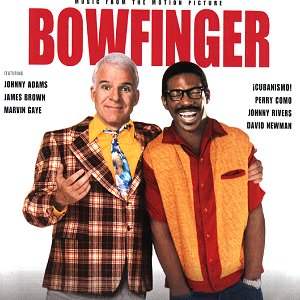
The tracks are:
1. There is always one more time.......Johnny Adams
2. You're a wonderful one.................Marvin Gaye
3. And I love you so..........................Perry Como
4. Mambo UK....................................Cubanismo!
5. Super bad, super slick.....................James Brown
6. Secret agent man............................Johnny Rivers
The remaining tracks are from the film score composed by David Newman
7. Betsy chases Kit/The first shot/A short ride/Dave makes a call/Dave returns camera
8. Cafe set-up/Shooting the cafe/Stealing Renfro's car/Auditioning the butts
9. "Chubby rain"
10.Clothing store/Daisy rescues Kit
11.The observatory
12.Finale/ Fed Ex delivers
This is really an album in two parts, one part features music written for the film by David Newman and the other part is of established icons of the pop world past and present "struttin' their stuff". I enjoyed the former more than the latter, the Bowfinger Band are a bunch of top professionals at work and they are all worthy of mention.
Steve Shaeffer-Drums and Percussion, Lenny Castro-Percussion, Mike long and Jim Cox Keyboards, Dean Parks and George Doering-Guitar, Neal Stubenhaus-Bass Guitar, Dan Higgins-Saxes and Gary Grant-Trumpet.
It is probably a sign of the times that the sound crew was as large as the Band! To my way of thinking this is a mixed blessing, whilst no-one can deny it has delivered a first class product, I would have loved to be in the studio to hear what the band sounded like live! (If you think these are the comments of an old saxophone player, you are probably correct!) The important thing however is that I enjoyed the music in this part of the CD so much, that I would like to see the film.
The first six tracks do however have their highlights, I particularly enjoyed 'Mambo UK', there is some excellent musicianship and arranging on display here. It would be nice to know who was responsible, the sleeve doesn't say. Johnny Adams on track one has a nice jazz feel to his vocals, Margin Aye and Perky Comma in their respective time, are in the "quality" pop business. Super bad, Super slick is James Brown with his own song and an excellent band, well worth a listen. The Johnny Rivers track is worthy of similar comments, but the backing reminds me of France Lain!
All in all a good value CD, I would give it four stars, if only for the film score, but I am sure many would disagree and award the stars for the vocals.
Reviewer
Don Mather

Carlo CRIVELLI La Balia.* Del Perduto Amore + * Orchestra Sinfonica Della Marsica + Bulgarian Symphony Orchestra
PACIFIC TIME PTE8515-2 [71:36]

Clearly Carlo Crivelli is a firm admirer of Bernard Herrmann for he quotes the swirling figures from Vertigo in both these scores and the Scene d'Amour obliquely in Del Perduto Amore.
It has to be said these are dark scores - many would say black - and they do not make easy or comfortable listening. La Balia opens menacingly with swirling, surging material; agitated string figures rush across the sound stage. This is darkly dramatic stuff , very operatic and, indeed in parts reminiscent of Verdi. For 'Annetta' Crivelli thins his texture so that it becomes almost a chamber ensemble with clarinet and cello prominent. This smaller ensemble continues through 'Le pazze' another highly disturbing cue remote, cold, intense with the music staccato and spaced with many short pauses. This music screeches, it is disconnected and dissonant. 'Il dolore inespresso' continues the mood and conveys at first inexpressive grief before harp figures gradually warm the temperature in preparation for 'Tema di Valeria' which is warmer and more lyrical but still tinged with melancholy.
The music for Del Perduto Amore is slightly warmer and more optimistic but not much. The opening title cue is romantic and sentimental with a harder dissonant middle section. Crivelli obviously favours harsh dissonant music to underscore menace this time from the Fascists, these manifest themselves as crude brass glissandos and other 'sour' figures and are met with proud defiance in such cues as 'La bellissima maestrina.' 'Il prete e il fascista' contrasts an elegant Mozart-like gentility with growly, gruff low woodwind figures. The swirling Herrmann quotations figure prominently in 'Distruzione della scuola' and in the nine-minute suite from the film which also includes music of passion that alludes to Herrmann's Scene d'Amour.
Strong stuff indeed, you'll need something much lighter as an antidote immediately after listening to this disc.
Reviewer
Ian Lace

And Didier C. Deutsch says:-
It would have helped enormously had the label, Pacific Time, provided some information about these films or, for that matter, composer Carlo Crivelli. But the scant text included with this CD, track listing over color photo (from what film?), doesn't reveal anything significant. Only a banner at the top of the booklet cover indicates that La Balia was an official selection at the 52nd Cannes Film Festival in 1999.
Directed by Marco Bellocchio, La Balia (The Nanny), a period drama, apparently made an impressive debut at the Festival, for its powerful austerity and solid technical assets. Based on a novel by Luigi Pirandello, this psychological costume drama set in the early 1900s, mingles profound topics such as mental disabilities, motherhood and marital instability, against the broader framework of social unrest and police repression. Typical of the director's usual approach, the film is a clinical look at these conflicting aspects, made even more oppressive as a result of Bellocchio's fondness for psychoanalytical comments that frequently interfere with the deliberately slow action. The story of a respected neuropsychiatrist, married to a much younger woman whose mental stability begins to fray following the birth of their son, and the effect of the arrival of a comely young country girl (the nanny of the title) has on them when she comes to care for the baby, La Balia suggested to Crivelli a score that has unnerving accents, probably as a reflection of the claustrophobic drama.
With frequent calls on the low strings, and only an occasional sprinkling of a flute to relieve the tedium, the cues sound ominous and profoundly disturbing. No doubt that, behind the action, they served their purpose and enhance the moods, but as an audio experience the sparse instrumentation and relative lack of melodic material do not provide much fodder for listening enjoyment.
The instrumentation is much more florid, and the themes much more attractive (probably to reflect the romantic aspects of the story itself) in Del Perduto Amore, a film directed by Michele Placido. But since there is no way to tell how the music parallels or informs the action, the listener's only frame of reference becomes the melodic aspects of the score, quite compelling. Generally speaking, the moods expressed here are also somber and deliberately slow, but the themes are attractively laid out, in a way that at times evokes Bernard Herrmann ("Distruzione della scuola," with its five-note motif that recalls the opening cue of Vertigo). Three long selections (including a 9:12 suite), give Crivelli (only known to this day for two minor scores, La condana and Il principe di Humburg) a better opportunity to show his mettle, and make a profound impression as a romanticist.
Of the two scores combined on this CD, this is probably the one that will involve the listener most, causing him/her to return more frequently to this set of cues. Too bad there is no way to determine how the music blends in with the action, and what role it plays in it.
Reviewer
Didier C. Deutsch

Paolo BUONVINO Come Te Nessuno Mai Music Composed, Orchestrated, and Directed by Paolo Buonvino
CAM 496125 [37:25]
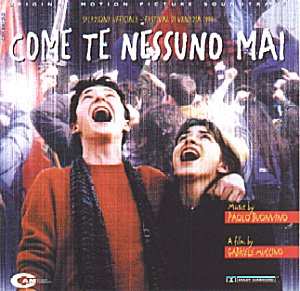
I had the mild pleasure of reviewing the "Ecco fatto" soundtrack earlier this year, and from the makers of that film now arrives another coming-of-age comedy from Italy, "Come te nessuno mai." Buonvino again uses light pop and ethnic music aspects in his orchestrations, but he accomplishes more than he has previously when it comes to juxtaposing the styles to form a score teeming with personality.
The presence of obvious pop ambient factors, likely used to lay stress on the contemporary setting as seen through the eyes of the film's teenage cast, cheapens the musical flow on a few bothersome occasions, but usually serves as support for the dramatic, orchestral current. Danny Elfman, David Shire, Jerry Goldsmith, Stanley Myers, and Hans Zimmer wrote hybrid film scores of their own, and Paolo Buonvino sounds quite skillful at it... The instrument run-down seems to be a 37-piece string orchestra, a 5-piece wind section, 2 French horns, a drum kit, a piano, a synthesizer, a lyre, and an accordion. If one accepts the idea that any musical instrument, used well (a rare event, that is true), can function beautifully and creatively as an addition to 'serious' composition, then this score is a minor miracle. Some may view the sour moments not as flaws, but as euphonious quirks.
Admittedly, the highest point of interest remains the diverse themes. A noteworthy peak of the score is a warmhearted waltz, titled 'Dylan,' that does not set new standards, but is superbly entertaining and, rather tellingly, caused me to punch the 'repeat' button on my stereo. The main theme, the 'Occupazione' theme, is quick, sly, and diligent, mixing together several forms under one roof. A secondary melody, the 'Achivio' theme, is more traditional, but orchestrated in manners that make me think it is fairly reminiscent of J.A.C. Redford's "The Astronomers," or a budget version of Jerry Goldsmith's "Congo!" The composer first introduces 'Empty' as an easy listening instrumental for accordion, finally as a vocal work performed by Francesca Belloni.
While this is one instance where the creative blend is frightfully uneven, it does work (if I may be so bold as to confess it) as easy listening.
Buonvino's approach is fascinating. Certainly it is not to everybody's taste, but one can become pleasantly surprised. This music is an excellent subject to explore.
Reviewer
Jeffrey Wheeler.

Nicola PIOVANI Tu Ridi (includes Mas Alla Del Jardin) Pacific Time PTE 8508-2
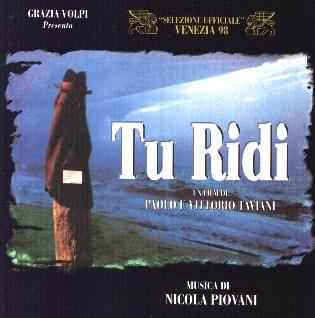
With well over 80 film scores to his credit, Nicola Piovani has been writing charming themes for films since 1970. Since his 1998 Oscar win for Life if Beautiful, Pacific Time has released a number of his scores for the North American audience.
Amongst them is the album Tu Ridi, which includes two gorgeous scores from the films, 1998's Tu Ridi (You Laugh) and 1997's Mas Alla Del Jardin (Beyond the Garden). In classic Piovani tradition, both revolve around compelling, lyrical main themes that are expressed strongly throughout the score with varied instrumentation. Piovani albums are easy to love for fans who love film music for those unforgettable themes. His main themes are always fabulous and memorable, and repeated enjoyably in different styles and tones in almost every track. There is very little background "filler" music to endure, as it were.
Whether Piovani simply selects the most melodic cues for release or he only writes melodic music, the entire listening experience of his albums is notably effortless and pleasing. His orchestration in both scores is phenomenal--this is one composer who has an intuitive grasp of the perfect blend of sounds and effects to pull heartstrings.
Tu Ridi's main theme is an enchanting tune with somewhat of a yearning, old world feel. Melting with the richness of ripe, vintage wine, the theme is unspeakably beautiful when performed with a cello in "Felice Abbandonato." Other times, the same melody expresses sorrow, hope, fear, and resolution, using different instruments and tempo. There is a second theme that soars at a faster tempo and climbs to mischievious heights, as if someone's mind is racing with plots. There are a few other cues that take different turns in mood, including a highly percussive dance with an electric guitar jamming away.
Mas Alla Del Jardin (Beyond the Garden) is likewise a spellbinding, eloquent piece. Here, Piovani wrote a main theme using strings galore, with a resounding, weighty opening and deep tones of viola and cello sweeping your heart away . At its best, it isjust primo. There is also a second main theme which makes this score much more romantic than Tu Ridi, marked by soothing, graceful melody for the garden. In the first "El Jardin" track, this theme is carried by glowing piano, the kind you can have an intimate candlelight dinner by . In the second "El Jardin" track, the same theme is played delicately on guitar like a gentle serenade. Though short, this is a truly precious gem of a score.
If there is a shortcoming to these scores, it would be that they are so short and there isn't more subtle developments within the musical story. But if you like emotionally luxurious, romantic classical sounds such as the music of Debbie Wiseman and Luis Bacalov, with grand explicit themes, you would love this album. This is a welcome oasis of splendid movie music in anotherwise dry thematic year.
Reviewer
Helen San

We are grateful to Helen San (www.cinemusic.net) for giving us permission to include this review which is currently appearing on her Film Music site.
Wojciech KILAR La Neuvième Porte (The Ninth Gate) OST Sumi Jo (Soprano); The City of Prague Philharmonic and Chorus conducted by Stepan Konicek
SILVA SCREEN FILMCD 321 [54:07]
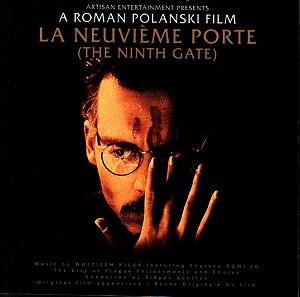
(There are 9 extra images for single file)
This Roman Polanski film, I understand, is about dark Satanic rites and it stars Johnny Depp in what promises to be one of his celebrated bizarre roles. The screenplay revolves around its characters vying for a certain book that includes the nine illustrations, reproduced below, all of them having hidden meanings.
Wojeiek Kilar has created, without having to resort to synth bolsterings, a sort of modern Gothic score that must be chillingly effective in the theatre. It is certainly darkly scary in its own right.
The first cue 'Vocalise' - the main theme lets us into the horrors gently with slow faltering piano and harpsichord figures supporting a sweetly melancholy soprano intoning wordlessly. The title is indicative for this track is very reminsicent of Rachmaninov's work of the same name. Clever this because Rachmaninov's music was often doom-laden and frequently based on the Dies irae chant for the dead. This cue becomes more intense as first upper strings joining the texture followed by lower stings adding gravitas. The Opening Titles are an exercise in deepest, blackest string writing suggesting a malignant stalking menace. Higher strings add staccato stabbings augmenting the sense of deep foreboding with no relief.
'Corso' is a strange jazzy contrast. Over syncopated harpsichord and pizzicato strings, an assertive, domineering solo trumpet holds centre stage. The music, at this point, sounds very much like Prokofiev or Shostakovich. Then lower woodwinds continue the jaunty syncopations grotesquely before doleful strings continue the slow malignant march of the Opening Titles. 'Bernie is dead' is another eerie/sinister/darkly comic cue for pizzicato double basses and bassoons with piano struck in its highest register, those syncopations return for a 'sick' funeral march. Liana moves the music to highest strings and treble percussion, piano, vibraphone, celeste, bells etc giving a remote, glistening other-worldly. The music is repetitive, almost hypnotic, minimalist Philip Glass-like subtly modulating and shifting dynamics. Another contrast presents itself as 'Plane to Spain' (Bolero) as the domineering trumpet now becomes really proud and haughty proclaiming over strong Spanish-rhythms in the strings. This part of the cue reminds one of both De Falla and Ravel but soon the rhythm slows and the mood darkens to a sense of foreboding once more. Those high pitched piano chords jar the nerves in The Motorbike before mysterious high sustained brass chords and bells with a sort of echoing soprano solo screw the tension tighter. The 'Missing Book' summons back the jazzy syncopated chords with harpsichord and trumpet making sardonic comment then 'Stalking Corso' has spaced pounding percussion, heavy piano chords and snarling brass in frightening crescendo - the writing shows marked originality over the usual chase music.
The calm before the storm comes with the short soprano solo 'Blood on his Face.' 'Chateau Saint Martin' is an eerie exercise for high strings and percussion with muffled cymbals it sounds like the chiming of many clocks and finally mournful and finaly disonant tolling of bells. 'Liana's Death, 'Boo' and 'The Chase' are all creepy, Gothic, fearsome don't look behind you cues all masterly written. But it is 'Balkan's Death' that really impresses. Timpani and percussive poundings with repeated tam-tam strokes and low bassoon grumblings suggest the beast arising from the fires of hell. A devilish men's chorus (Orf-like) reinforces this feeling of utter evil and malice. Only the soprano voice promises any relief. 'The Ninth Gate' is another remote-sounding soprano solo followed by mysterious high register music seems to usher in music that has a redeeming radiance. 'Corso and the Girl' suggests victory of light over darkness - or does it?
Soprano Sumi Jo's beautifully pure tones add poignancy in contrast with the score's palpable malignancy; and the City of Prague Philharmonic is on top form. An extraordinary, darkly memorable score.
Reviewer
Ian Lace

There are more >>>>>
Return to October index [Part 1] [Part 2] [Part 3]
COMPETITION WIN a CD of your Choice

Search the Crotchet database from here
Discs on these pages are offered for sale. There is also a page of search engines from a selection of on-line retailers here.
Please support this web-site by buying your discs here.
Disclaimer: Every effort is made to make sales links to the correct disc but, in the end, you must take responsibility for checking that what you are purchasing is what you want. Some of these discs were not actually available for sale at the time of posting but a link has been made in anticipation of their forthcoming availablility.
Return To Film Music on the Webe-mail: info@musicweb.uk.net